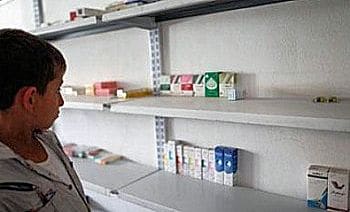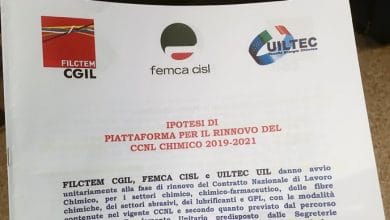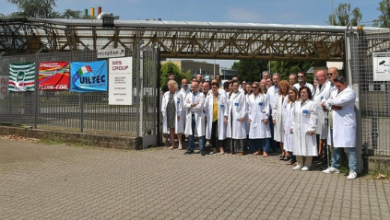
Altroconsumo meets with the leaders of Aifa to ask what reasons are at the basis of the fact that there are "drugs that disappear and reappear in pharmacies with exponential increases, unjustified in the eyes of patients". The distributors' commercial policy causes price increases
 “Drugs that disappear and reappear in the pharmacy with increases exponential, unjustified in the eyes of patients complaint Other consumption, who at the top of Aifa (Italian Medicines Agency), asks what reasons are at the basis:
“Drugs that disappear and reappear in the pharmacy with increases exponential, unjustified in the eyes of patients complaint Other consumption, who at the top of Aifa (Italian Medicines Agency), asks what reasons are at the basis:
– of the disproportionate increases price of the three drugs of the Aspen Pharma;
– the ministerial response to the parliamentary question on drug price increases. In particular Alkeran-melphalan (from 5.23 euros to 85.83 euros), Leukeran-chlorambucil (from 7.13 euros to 90.20 euros) Purinethol-mercaptopurine (from 15.98 euros to 90.35 euros). The answer of the Ministry of Health which refers to an alignment with the lowest prices in Europe is refuted by Altroconsumo's analysis which highlights how, on the contrary, in countries such as Greece, Spain and Portugal the price of Aspen's medicines continues to remain very low, as he was in Italy before the increases. – of having consented to the passage from class A to class C of Melphalan, because drug obsolete. Thanks to this transfer the price of the Myleran-busulfan in March 2014 it went from 15.78 euros to 387.84 euros: the price that citizens would have to pay to access obsolete treatment.
– of why Aifa failed to withdraw the obsolete drug from the market, given that by law it has the right to do so.
Other consumption he concludes, thus emphasizing how “the increase in these prices in Italy appears unjustified in any case, even if the tendency will be to bring drug prices into line sooner or later in all European countries”.
Editorial board
Related news:
Shortages, focus the problem on drug quotas
Drug shortages, Cini: separate pharmacy and wholesale distribution
Medicines shortage: let's transform them from a cost into a resource for the Health Service.
M5S. Aifa: if it doesn't do its duty, what is it for?
Shortages, Altroconsumo: distributors' commercial policy due to price increases
A shortage of drugs increases the pharmaceutical company's negotiating power when it sits down at the table with Aifa.
Saturday, 01 November 2014 – Pharmacist33
The disproportionate increases in the price of some drugs that have reappeared on the market after a period of unavailability are due to the commercial policy of the distributors on which Aifa has limited margins for intervention.
This is what emerged, according to what he says to the Pharmacist33 Luisa Crisigiovanni, secretary general of Altroconsumo, from Altroconsumo's meeting with Aifa top management which followed up on various reports made by the consumers' association in recent months.
«The meeting ended with the hope of greater collaboration» says Crisigiovanni «but AIFA replied that the disproportionate increases in the price of these drugs are due to a commercial policy of the distributors and that its margins of intervention they are reduced.
The wholesalers, through parallel exports, in fact cause a shortage of these drugs, which increases the negotiating power of the pharmaceutical company when it sits at the table with Aifa, whose only way to put them back into circulation would be to increase their price».
Basically, the high costs are not mainly attributable to those who produce the drugs but to those who distribute them and for some in particular, adds Crisigiovanni, "there has been a transition from one pharmaceutical company to another with a problem of selling of patent rights and AIFA should have to some extent submitted to the requests also for this reason».
The price increases were determined by a problem of ownership of the patent rights on the drug on the one hand, while on the other they were linked to the commercial policy "which unfortunately these companies are implementing to the detriment of citizens by dumping, going to get paid where the price is higher.
Renato Torlaschi
Shortage of drugs: Federfarma Rome, now the government is moving
Court of Rome, corrective actions are needed (ASCA) – ROME, 31 Oct 2014 – “We welcome with satisfaction the provision of the Court of Rome which, in fact, invites the Italian institutions to intervene as soon as possible, from a regulatory point of view, on the still existing problem of the shortage and/or rarefaction of some categories of medicines, as we reported more than 1 year ago”. So the president of Federfarma Rome, Frank Caprino, comments on the provision of the investigating judge who, although dismissing the complaint by the association, underlined that "the rarefaction of certain categories of drugs, quantitatively unsuitable to meet the demands of users, is a negative consequence of a lack of regulatory framework and in need of corrective action”. In summary, explains Caprino, the court order "gives a clear message to the Government, that of taking actions to review the dynamics that regulate the business of the parallel market", thanks to which wholesalers and pharmacists buy medicines destined for the Italian market and then resell them in markets where you earn more, such as Germany or the United Kingdom. In this sense, concludes the president of Federfarma, "we hope that Italy, as leader of the European Semester, will really be able to put its hand to a regulation that up to now has had the great demerit of primarily damaging citizens". Among the drugs affected by the parallel market, there are anticancer drugs, antidepressants, products for the treatment of Parkinson's disease and hypertension, and antiepileptics, bronchodilators, blood thinners and cholesterol-lowering drugs. red/mpd





